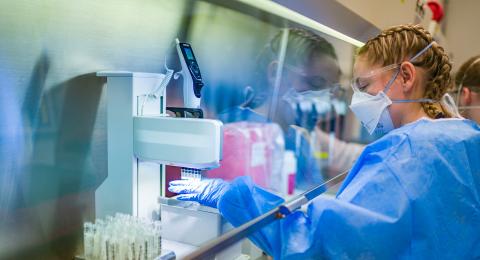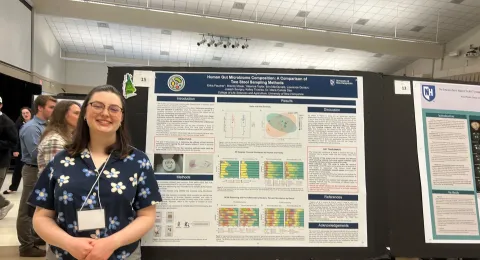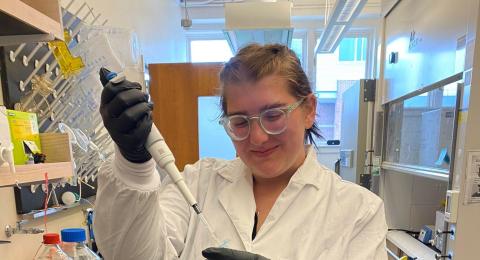The Biomedical Sciences: Medical Microbiology major at UNH offers you a deep understanding of microorganisms and their impact on human health. This specialized program provides comprehensive training in the study of bacteria, viruses, fungi and parasites, emphasizing their roles in infectious diseases. You will gain valuable laboratory skills through hands-on experience in identifying and analyzing pathogens. With the growing importance of microbiology in healthcare, this major prepares you for a career that could lead you to contribute to advancements in disease prevention, treatment and global health initiatives.
What is medical microbiology?
Medical microbiology explores the world of microorganisms, including bacteria, viruses and parasites, and how they interact with both humans and animals. This degree program provides you with excellent academic training and laboratory experiences in the areas of microbiology, infectious disease and public health. Graduates are prepared for successful careers in biotechnology or public health, or for entry into graduate school or health professional programs.
Why study medical microbiology at UNH?
Students receive outstanding academic preparation and intensive lab experiences that position them for successful careers. The Medical Microbiology major has highly experienced faculty with demonstrated excellence in teaching, research and career guidance. Students have access to state-of-the-art facilities in faculty research labs, the Hubbard Center for Genome Studies, the University Instrumentation Center, and the NH Veterinary Diagnostic Laboratory located on campus. Internships are possible at biotechnology companies in the Greater Boston area or at the NH Department of Public Health Laboratories.
Potential Career Areas
- Biotechnology industry
- Research in academic, medical, biotechnology sector, or government labs
- Healthcare
- Public health departments
- Pharmaceutical research & development
- Veterinary medicine
- Forensic laboratories
- Education
Curriculum & Requirements
The Biomedical Science: Medical Microbiology (BMS:MM) program explores the world of microorganisms and how they interact with both humans and animals. This major provides you with excellent academic training and laboratory experiences in the areas of microbiology, infectious disease, and public health. BMS:MM graduates are prepared for successful careers in biotechnology or public health, or entry into graduate school or health professional programs.
The BMS:MM program includes course work and laboratories in:
- infectious disease
- immunology
- epidemiology and community health
- molecular biology
- microbial ecology and evolution
Students in the BMS:MM program may participate in a variety of experiential learning activities including:
- independent research experiences in laboratories of UNH biomedical science faculty
- work at the NH Veterinary Diagnostic Laboratory located on the UNH campus
- internships at biotechnology companies in the Greater Boston area
- internships at the NH Department of Public Health Laboratories
BMS:MM graduates have been successful in attaining careers as:
- research scientists/laboratory technicians
- biotechnology and pharmaceutical companies
- academic biomedical research programs
- brewing industry
- primary and secondary school educators (requires additional coursework in education)
- state and federal government employees
- public health laboratories
- regulatory agencies (e.g., U.S. Food and Drug Administration)
BMS:MM graduates are prepared for post-baccalaureate education in:
- professional health programs
- medical school
- dental school
- allied health programs (physician assistant, pharmacist, nursing, or pathologist’s assistant programs)
- graduate programs
- biomedical science
- public health
- forensic science
Sample Degree Plan
This sample degree plan serves as a general guide; students collaborate with their academic advisor to develop a personalized degree plan to meet their academic goals and program requirements.
| First Year | ||
|---|---|---|
| Fall | Credits | |
| MCBS 401 | Professional Perspectives in Molecular, Cellular, and Biomedical Sciences | 1 |
| BIOL 411 | Introductory Biology: Molecular and Cellular | 4 |
| ENGL 401 | First-Year Writing | 4 |
| CHEM 403 | General Chemistry I | 4 |
| Discovery Course | 4 | |
| Credits | 17 | |
| Spring | ||
| BIOL 412 | Introductory Biology: Evolution, Biodiversity and Ecology | 4 |
| MATH 424B | Calculus for Life Sciences | 4 |
| CHEM 404 | General Chemistry II | 4 |
| Discovery Course | 4 | |
| Credits | 16 | |
| Second Year | ||
| Fall | ||
| BMS 503 & BMS 504 | General Microbiology and General Microbiology Laboratory | 5 |
| GEN 604 | Principles of Genetics | 4 |
| CHEM 545 & CHEM 546 | Organic Chemistry and Organic Chemistry Laboratory | 5 |
| Discovery Course | 4 | |
| Credits | 18 | |
| Spring | ||
| BMS 602 & BMS 603 | Pathogenic Microbiology and Pathogenic Microbiology Laboratory | 5 |
| BMCB 605 | Principles of Cell Biology | 4 |
| BIOL 528 | Applied Biostatistics I | 4 |
| Discovery Course | 4 | |
| Credits | 17 | |
| Third Year | ||
| Fall | ||
| BMS 705 & BMS 715 | Immunology and Immunology Laboratory | 5 |
| PHYS 401 | Introduction to Physics I | 4 |
| BMCB 658 & BMCB 659 | General Biochemistry and General Biochemistry Lab | 5 |
| Discovery Course | 4 | |
| Credits | 18 | |
| Spring | ||
| BMS 706 & BMS 708 | Virology and Virology Laboratory | 5 |
| PHYS 402 | Introduction to Physics II | 4 |
| Major Elective | 4 | |
| Discovery Course | 4 | |
| Credits | 17 | |
| Fourth Year | ||
| Fall | ||
| Major Elective (possible Capstone course) | 4 | |
| Major Elective | 4 | |
| Elective (any course) | 3-4 | |
| Elective (any course) | 3-4 | |
| Credits | 14-16 | |
| Spring | ||
| Major Elective | 4 | |
| Major Elective | 4 | |
| Elective (any course) | 3-5 | |
| Elective (any course) | 3-5 | |
| Credits | 14-18 | |
| Total Credits | 131-137 | |
Degree Requirements
All Major, Option and Elective Requirements as indicated.
*Major GPA requirements as indicated.
Major Requirements
Students in the Medical Microbiology (MM) option take seven Foundation courses, six Bioscience Core courses, four BMS:MM Core courses, and five BMS:MM Major Elective courses. One capstone experience, supervised and approved within the major, is required of all seniors. In addition, all other University academic requirements must be completed, including those for the Discovery Program and the University Writing Requirement.
A grade of C-minus or better is required in all Bioscience Core, BMS:MM Core, and Major Elective courses.
Foundation Courses
| Code | Title | Credits |
|---|---|---|
| CHEM 403 | General Chemistry I 1 | 4 |
| CHEM 404 | General Chemistry II | 4 |
| CHEM 545 & CHEM 546 | Organic Chemistry and Organic Chemistry Laboratory 2 | 5 |
| MATH 424B | Calculus for Life Sciences 3 | 4 |
| BIOL 528 | Applied Biostatistics I 4 | 4 |
| PHYS 401 | Introduction to Physics I | 4 |
| PHYS 402 | Introduction to Physics II | 4 |
Bioscience Core Courses
| Code | Title | Credits |
|---|---|---|
| BIOL 411 | Introductory Biology: Molecular and Cellular 5 | 4 |
| BIOL 412 | Introductory Biology: Evolution, Biodiversity and Ecology 2 | 4 |
| or BMS 508 | Human Anatomy and Physiology II | |
| BMS 503 & BMS 504 | General Microbiology and General Microbiology Laboratory | 5 |
| GEN 604 | Principles of Genetics | 4 |
| BMCB 605 | Principles of Cell Biology | 4 |
| BMCB 658 & BMCB 659 | General Biochemistry and General Biochemistry Lab | 5 |
- 1
CHEM 403 fulfills the Physical Science Discovery requirement
- 2
Students applying to health profession schools need a full year of Organic Chemistry, a full year of Introductory Biology, and a full year of English. CHEM 651/CHEM 653 and CHEM 652/CHEM 654 should be taken in place of CHEM 545/CHEM 546; ENGL 502 or ENGL 503 is suggested in addition to ENGL 401.
- 3
MATH 424B fulfills the Quantitative Reasoning Discovery requirement.
- 4
PSYC 402 and SOC 402 are acceptable alternatives.
- 5
BIOL 411 fulfills the Biological Science Discovery requirement, Discovery Laboratory requirement, and the Discovery Inquiry requirement.
BMS-MM Core Courses
| Code | Title | Credits |
|---|---|---|
| BMS 602 & BMS 603 | Pathogenic Microbiology and Pathogenic Microbiology Laboratory | 5 |
| BMS 705 & BMS 715 | Immunology and Immunology Laboratory | 5 |
| BMS 706 & BMS 708 | Virology and Virology Laboratory | 5 |
| MCBS 401 | Professional Perspectives in Molecular, Cellular, and Biomedical Sciences | 1 |
- 6
Required for first-year students only.
BMS-MM Major Elective Courses
A total of five unique major elective courses is required. At least one course must be taken in each of the following subject areas: Host-Microbe Interaction Electives, Molecular Biology Electives, and Community Electives. Two additional courses are taken from any of the major elective subject areas.
Host-Microbe Interaction Electives
| Code | Title | Credits |
|---|---|---|
| BMS 655 | Human and Animal Parasites 7 | 3 |
| BMS 703 | Infectious Disease and Health | 4 |
| BMS 704 | Pathologic Basis of Disease | 4 |
| BMS 719 | Host-Microbe Interactions 7 | 4 |
| BMS 720 | Mycology, Parasitology, and Virology | 3 |
| BMS 735 | Molecular and Cellular Parasitology 7 | 4 |
| BMS 740 | Human Microbiome 7 | 4 |
Molecular Biology Electives
| Code | Title | Credits |
|---|---|---|
| BMS 623 | Histology: Microscopic Cellular Structure and Function | 4 |
| BMS 650 | Molecular Diagnostics | 4 |
| BMS 655 | Human and Animal Parasites 7 | 3 |
| BMS 711 | 4 | |
| BMS 719 | Host-Microbe Interactions 7 | 4 |
| BMS 725 | Cell Phenotyping and Tissue Engineering Laboratory | 4 |
| BMS 735 | Molecular and Cellular Parasitology 7 | 4 |
| BMS 740 | Human Microbiome 7 | 4 |
| BMCB 753 | Cell Culture | 5 |
| BMCB 754 | Molecular Biology Research Methods | 5 |
| BMCB 763 | Biochemistry of Cancer | 4 |
| GEN 704 | Microbial Genetics and Genomics | 5 |
| GEN 717 | Molecular Microbiology | 5 |
| GEN 721 | Comparative Genomics | 4 |
- 7
Course may be used as either a Host-Microbe Interaction elective or Molecular Biology elective, but not both.
Community Electives
| Code | Title | Credits |
|---|---|---|
| ANSC 602 | Animal Rights and Societal Issues | 4 |
| ANTH 685 | Gender, Sexuality and HIV/AIDS in Africa | 4 |
| BIOL 706 | Data Science with R for the Life Sciences | 4 |
| BMS 730 | Ethical Issues in Biomedical Science | 4 |
| GEN 705 | Population Genetics 8 | 3 |
| GEN 713 | Microbial Ecology and Evolution | 4 |
| HMP 501 | Epidemiology and Community Medicine | 4 |
| SOC 635W | Medical Sociology | 4 |
- 8
Enrolling in GEN 725 concurrently is encouraged but not required
Other Major Electives
| Code | Title | Credits |
|---|---|---|
| BMS 795 | Investigations in Biomedical Science (4-credit minimum) | 1-8 |
| BMS 795W | Investigations in Biomedical Science (4-credit minimum ) | 1-8 |
| BMS 799 | Senior Thesis (4-credit minimum) | 1-4 |
| BMS 799H | Senior Honors Thesis (4-credit minimum) | 1-4 |
| INCO 790 | Advanced Research Experience (4-credit minimum) | 1-4 |
BMS:MM Capstone
The capstone explores areas of interest based on the integration of prior learning. The capstone requirement may be satisfied through a course, created work or product, or some form of experiential learning (e.g., honors thesis, mentored research project, or other special student activity). Students may take more than one capstone course. Capstone completion is never displayed on Degree Works; your advisor will certify capstone completion at the time of graduation. Students must have 90 credits or more when completing their capstone requirement. See your advisor for questions about capstones.
Approved BMS:MM Capstone Courses
| Code | Title | Credits |
|---|---|---|
| BMS 719 | Host-Microbe Interactions | 4 |
| BMS 730 | Ethical Issues in Biomedical Science | 4 |
| BMS 735 | Molecular and Cellular Parasitology | 4 |
| BMS 740 | Human Microbiome | 4 |
| BMS 795 | Investigations in Biomedical Science (4-credit minimum) | 1-8 |
| BMS 795W | Investigations in Biomedical Science (4-credit minimum ) | 1-8 |
| BMS 799 | Senior Thesis (4-credit minimum) | 1-4 |
| BMS 799H | Senior Honors Thesis (4-credit minimum) | 1-4 |
| GEN 704 | Microbial Genetics and Genomics | 5 |
| GEN 717 | Molecular Microbiology | 5 |
| INCO 790 | Advanced Research Experience (4-credit minimum) | 1-4 |
For a Capstone experience not listed above, such as an internship, submit a Capstone Experience Approval form prior to beginning the experience.
Program Learning Outcomes
Core Knowledge
- Students will demonstrate an understanding of core knowledge in biochemistry, molecular biology, cell biology, genetics & biomedical sciences.
Quantitative Literacy, Inquiry & Analysis
- Students will be able to apply the scientific method to examine experimental evidence and draw informed conclusions.
- Students will be able to use graphs to represent scientific data.
- Students will be able to apply statistical methods to interpret scientific data.
Critical Thinking & Problem Solving
- Students will be able to use data to troubleshoot an unexpected outcome.
- Students will be able to apply core knowledge to critically interpret scientific data.
Written Communication
- Students will demonstrate written skills to communicate scientific knowledge and experimental data.
Oral Communication
- Students will be able to demonstrate oral presentation skills to communicate scientific knowledge and experimental data.
Biomedical Science: Medical Microbiology option
- Students will be able to compare and contrast cellular and non-cellular microorganisms.
- Students will understand basic structure-function relationships of microorganism components, and explain how specific microbial components contribute to a microorganism’s growth and survival.
- Students will be able to discuss basic metabolic pathways that allow microorganisms to grow, thrive, and survive in numerous environments
- Students will understand how genetic information is maintained and transferred, how mutation can affect viability and contribute to evolution, and how gene expression is regulated.
- Students will be able to discuss the role of microorganisms in human and animal health and explain, using specific examples, how microbes can be both harmful and beneficial.
Explore Program Details
Thank you for your interest in the Biomedical Science: Medical Microbiology Option. We’ve assembled a brief FAQ regarding some of the most commonly asked questions about the option.
What is the Biomedical Science: Medical Microbiology option?
Biomedical Science: Medical Microbiology (BMS: MM) is an option within the undergraduate program (major) Biomedical Science. Our major option focuses on microorganisms (bacteria, viruses, protists, fungi, etc) and how they interact with humans and animals, cause infectious disease, and are utilized for progressing science and society.
How it the Medical Microbiology option different from other options in Biomedical Science?
The Medical Microbiology option is focused on microorganisms and infectious disease. Medical Laboratory Science is focused on clinical diagnostics and its role in diagnosing human disease. Medical and Veterinary Science is a more broad option that covers both human and animal health, infectious disease and non-infectious disease.
What do students with a degree in Biomedical Science: Medical Microbiology do after they graduate?
Our graduates are prepared for careers in biotechnology, clinical research, and academic research. Many choose to go on to graduate school in the biological sciences and public health, health professional schools (Medical, Dental, Physician’s Assistant), and allied health training programs (Pathologist Assistant, Cardiac Perfusion, Forensics, etc). If you are interested in where our alumni are currently employed or in school please contact Dr. Tim Montminy (timothy.montminy@unh.edu) for a current list.
Do students in this option conduct research on campus?
Yes, many of our students conduct independent research working with a faculty mentor in a research lab. We cannot guarantee that every student will find an opening in a research lab, but our option includes multiple courses that have independent research components, including laboratories in the Human Microbiome, Prokaryotic Genetics, Cell Culture, and Molecular Microbiology.
Do students in this option take a lot of laboratories?
YES. Microbiology is a lab driven science. Our students take mandatory laboratories in Biology, Biochemistry, Microbiology, Pathogenic Microbiology, Virology, and Immunology. Many of our major elective courses also include laboratories. The high level of laboratory training makes our students very competitive when applying for employment and/or graduate school.
How big is this option?
The Biomedical Science: Medical Microbiology Option generally houses 85-100 total students, with 20-25 students per graduating class. Our students generally get to know each other and their faculty quite well. We even have major get-togethers once a semester.
Are students in this option prepared for work in a clinical microbiology diagnostic laboratory?
No. Students interested in diagnostic microbiology should consider the Medical Laboratory Science option.
Are students in this option prepared for medical school or dental school?
They can be. Our program has considerable flexibility to accommodate students interested in medical or dental school. Students can complete the requirements for these programs without overloading their schedules. Our faculty advisors are experienced in helping pre-med or pre-dental students take the course they need for professional school. We have a number of recent graduates in medical school and have a good acceptance rate for our applicants.
Are students in this option prepared for physician’s assistant programs?
Yes. Our program requirements meet the generally accepted requirements for Physician’s Assistant programs. We have a number of recent graduates in Physician’s Assistant programs and a good acceptance rate for our applicants.
Is this major dangerous? Don’t you guys do lab work with things that can make you sick?
NO, our major is NOT dangerous. Our laboratory courses are well designed and taught by trained personnel with lots of experience. We pride ourselves in giving students experience working SAFELY with pathogenic microorganisms.
Advising is available for UNH students, alumni, and post baccalaureates pursuing health professional careers.
The Pre-Health Advising Office provides support throughout the process of preparing for health professions school from advising on the courses they should take to helping navigate through the complex steps of the application process.
Register with Pre-Professional Health Office
As part of the University of New Hampshire’s Discovery Program requirements, all students must complete a Capstone experience.
Students interested in the Biomedical Sciences: Medical Microbiology major may also be interested in the following advanced degrees at UNH. Students in the program also have the opportunity to participate in the UNH accelerated master’s program.
Molecular and Cellular Biotechnology M.S.
Molecular and Evolutionary Systems Biology Ph.D.
Biotechnology: Industrial and Biomedical Sciences, Manchester M.S.


















